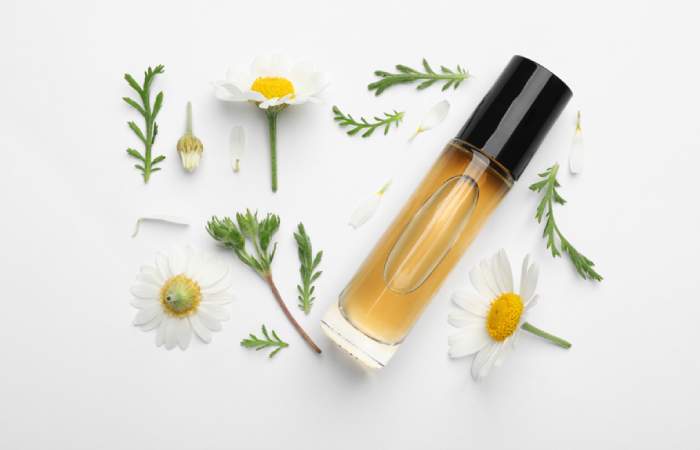Using natural skincare ingredients over synthetic counterparts means that you aren’t putting potentially harmful chemicals on your skin. This helps to reduce irritation, calm and soothe your skin, and promote a youthful and glowing complexion. Skincare products with natural ingredients can work to nourish, protect, and improve your skin when used consistently over time.
So how do you know what ingredients are natural? Educating yourself is the first step to being able to read a label and identify natural skincare ingredients. To help you out, we’ve put together this guide that covers five main categories of natural skincare ingredients and lists some examples for each one. Keep an eye for these natural ingredients the next time you are shopping for skincare!
Table of Contents
Essential Oils
Oils create an occlusive barrier on the top of your skin, helping to prevent moisture loss and alleviate dry skin. When incorporated into products such as clay cleansers, oils also prevent them from becoming too stripping. Some essential oils to know are:
- Lavender oil: Lavender is a natural hydrator that also helps to balance oil levels in the skin, so that your skin is perfectly moisturized without being too greasy. It also contains anti-inflammatory properties that can soothe redness and help to calm irritated skin.
- Tea tree oil: Tea tree is a natural antiseptic, which is why it has historically been used for wound care in ancient times. It helps to fight both bacteria and inflammation, which is why it’s especially beneficial for people who struggle with acne.
- Rosehip oil: Rosehip oil contains vitamins A, C, and E, as well as lots of fatty acids. This means that it has anti-inflammatory benefits that can calm redness and breakouts. It may also help to stimulate collagen production, which can improve the appearance of fine lines and wrinkles.
Botanical Extracts
Botanical extracts are concentrated plant compounds that offer numerous benefits for the skin, including antimicrobial, antioxidant, and anti-inflammatory properties. Like essential oils, different botanical extracts have their own unique benefits. Some botanical extracts to know are:
- Aloe Vera Extract: Aloe Vera is rich in antioxidants, so it helps to fight free radical damage. It’s also very soothing and anti-inflammatory, making it a great choice for stressed out skin of all kinds. It’s so much more than a sunburn remedy!
- Green Tea Extract: This incredibly versatile ingredient can help treat everything from acne to anti-aging. It also helps to fight against free radical damage in addition to reducing excess sebum, soothing the skin, and reducing signs of aging like fine lines.
- Chamomile Extract: Chamomile isn’t just soothing for your tummy, it’s also soothing for your skin. Applying chamomile extract topically helps to calm redness and inflammation. It may also help to address skin concerns such as hyperpigmentation, eczema, and acne.

Hydrating Ingredients
Hydrating ingredients help to attract moisture to your skin as well as retain water to keep your skin looking plump and healthy. Whether you have dry or oily skin, hydrating ingredients are a must for any skincare routine. Here are some natural hydrating ingredients to look out for:
- Hyaluronic acid: Hyaluronic acid is already produced by our skin and helps to increase the moisture content in your skin. Applying more hyaluronic acid topically just increases the hydration even further and can help to increase skin elasticity and smooth out the appearance of wrinkles.
- Glycerin: Glycerin also works as a humectant, attracting moisture from the air deep into your skin. It’s just as effective as hyaluronic acid and works for many different skin types.
- Honey: Not only does honey deeply moisturize and hydrate your skin, it also helps to soothe irritation and redness thanks to its antimicrobial properties. Because of honey’s thicker texture, it’s an especially good choice for people with dry skin.
Exfoliants and Enzymes
Natural enzymes are a great choice for gentle exfoliation, since they help to remove dead skin cells without irritating the rest of your skin. Plant enzymes are gentle enough to be used on more sensitive skin or for more frequent exfoliation. Here are some plant exfoliating agents to watch out for:
- Sugar: Sugar crystals are an awesome natural exfoliant, which is why they’re the star ingredient of many sugar scrubs. Since sugar dissolves in water, these scrubs are easy to wash away and won’t remain on your skin.
- Papaya enzymes: In addition to removing dead skin cells, papaya enzymes are also rich in vitamins and antioxidants, so they will nourish your skin as they exfoliate.
- Pineapple enzymes: Pineapple is naturally high in vitamin C, which helps to brighten the complexion and fight free radical damage. It’s also very high in natural exfoliating factors that will leave your complexion smooth and glowing.
Antioxidant Powerhouses
Antioxidants help to protect against free radicals from pollution and UV exposure, which damage cells and can speed up the signs of aging. While antioxidants are no replacement for sunscreen, they are still an essential part of every skincare routine. We’ve already talked about one antioxidant, green tea, but here are a couple more that you should know about:
- Vitamin C: Vitamin C brightens and smoothes the complexion, and also helps to address existing hyperpigmentation and prevent it from happening in the future.
- Pomegranate: Pomegranate is naturally high in vitamin C as well as other antioxidants such as anthocyanins, ellagic acid, and tannins that help to soothe dry skin as well as brighten the complexion.
We hope this guide helped get you started on your journey to learn more about natural skincare. Still not sure which natural skincare ingredients are right for your unique needs? Take this personalized skincare quiz to find out!
